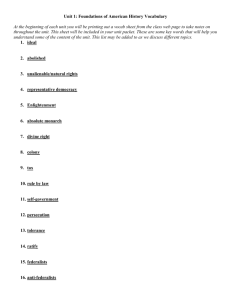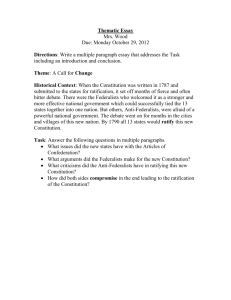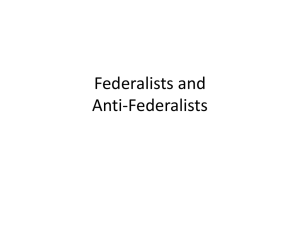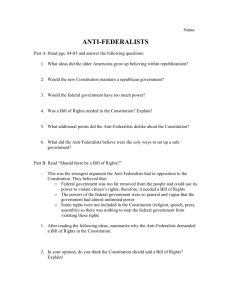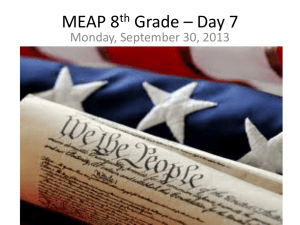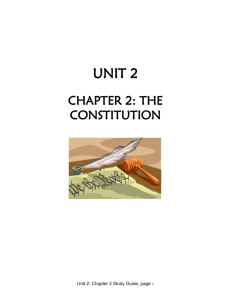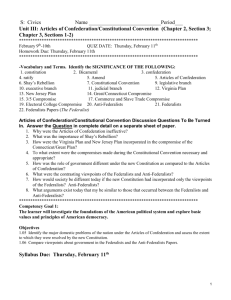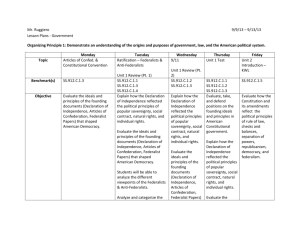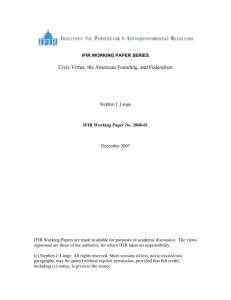crossfire
advertisement
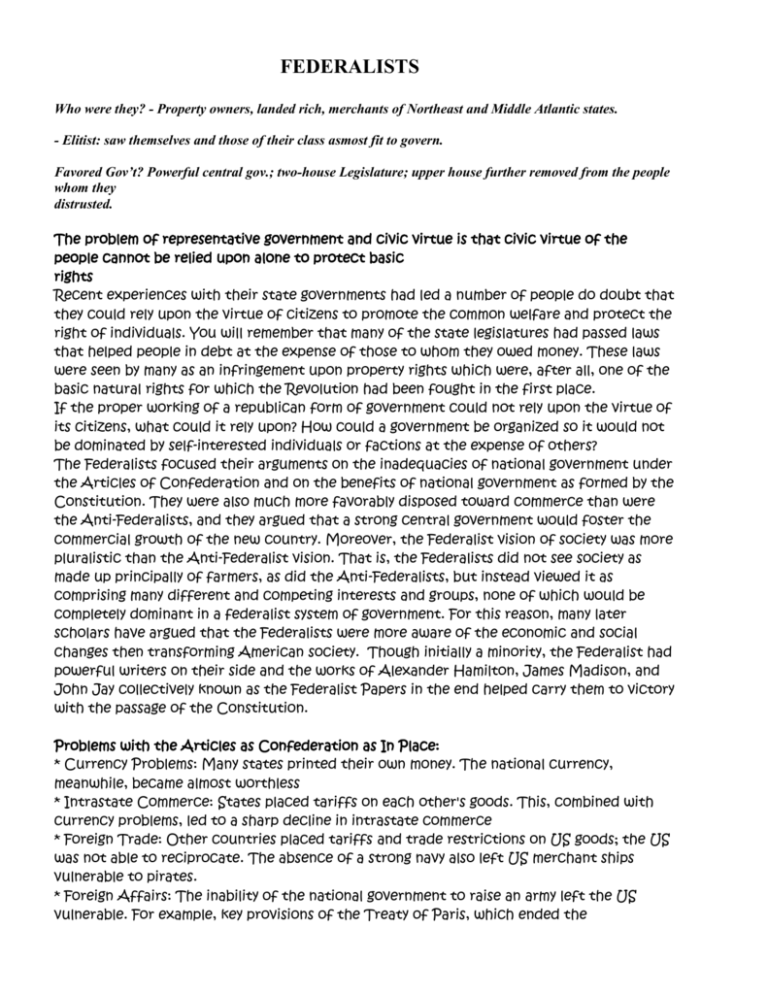
FEDERALISTS Who were they? - Property owners, landed rich, merchants of Northeast and Middle Atlantic states. - Elitist: saw themselves and those of their class asmost fit to govern. Favored Gov’t? Powerful central gov.; two-house Legislature; upper house further removed from the people whom they distrusted. The problem of representative government and civic virtue is that civic virtue of the people cannot be relied upon alone to protect basic rights Recent experiences with their state governments had led a number of people do doubt that they could rely upon the virtue of citizens to promote the common welfare and protect the right of individuals. You will remember that many of the state legislatures had passed laws that helped people in debt at the expense of those to whom they owed money. These laws were seen by many as an infringement upon property rights which were, after all, one of the basic natural rights for which the Revolution had been fought in the first place. If the proper working of a republican form of government could not rely upon the virtue of its citizens, what could it rely upon? How could a government be organized so it would not be dominated by self-interested individuals or factions at the expense of others? The Federalists focused their arguments on the inadequacies of national government under the Articles of Confederation and on the benefits of national government as formed by the Constitution. They were also much more favorably disposed toward commerce than were the Anti-Federalists, and they argued that a strong central government would foster the commercial growth of the new country. Moreover, the Federalist vision of society was more pluralistic than the Anti-Federalist vision. That is, the Federalists did not see society as made up principally of farmers, as did the Anti-Federalists, but instead viewed it as comprising many different and competing interests and groups, none of which would be completely dominant in a federalist system of government. For this reason, many later scholars have argued that the Federalists were more aware of the economic and social changes then transforming American society. Though initially a minority, the Federalist had powerful writers on their side and the works of Alexander Hamilton, James Madison, and John Jay collectively known as the Federalist Papers in the end helped carry them to victory with the passage of the Constitution. Problems with the Articles as Confederation as In Place: * Currency Problems: Many states printed their own money. The national currency, meanwhile, became almost worthless * Intrastate Commerce: States placed tariffs on each other's goods. This, combined with currency problems, led to a sharp decline in intrastate commerce * Foreign Trade: Other countries placed tariffs and trade restrictions on US goods; the US was not able to reciprocate. The absence of a strong navy also left US merchant ships vulnerable to pirates. * Foreign Affairs: The inability of the national government to raise an army left the US vulnerable. For example, key provisions of the Treaty of Paris, which ended the Revolutionary War, were not enforced. As a result, the British continued to occupy forts in the Northwest territory -- landed that had technically been ceded to the US. ANTI-FEDERALISTS Who were they? Small farmers, shopkeepers, laborers Political Philosophy: Believed in the decency of the common man and in participatory democracy; viewed elites as corrupt; sought greater protection of individual rights. Type of Government favored Wanted stronger state governments (closer to the people) at the expense of the powers of the national government. Sought smaller electoral districts, frequent elections, referendum and recall, and a large unicameral legislature to provide for greater class and occupational representation. The importance of representative government and civic virtue In general, the Anti-Federalists were older Americans, who had grown up believing in the basic ideas of republicanism. These included the idea that in a republic, the greatest power should be placed in a legislature composed of representatives elected by the people of a community. It had always been thought that this kind of representative government would only work in a small community of citizens with similar interests and beliefs, because in such a community it would be easier for people to agree upon what was in their common welfare. In addition, it was widely believed that people living in small agrarian communities would be more likely to possess the civic virtue required of republican citizens. Living closely together they would be more likely to be willing to set aside their own selfish interests when necessary and to work together for their common welfare. The Anti-Federalists understood that the Federalists were proposing a government that was the opposite of this type of republican government. It was large and powerful, it included numerous diverse communities, and its capital would be far away from most of the people it represented. The AntiFederalists believed such a system would inevitably pose a threat to the rights of the people. Many distinguished Americans were Anti-Federalists. Prominent AntiFederalists included George Mason, Patrick Henry, Richard Henry Lee, Robert Yates, and George Clinton. Problems with the Constitution as Conceived: The Anti-Federalists argued that the Constitution had the following flaws. · It gave too much power to the national government at the expense of the powers of the state governments. · It gave too much power of the executive branch of the national government at the expense of the other branches. · It gave Congress too much power because of the “necessary and proper clause.” · It did not adequately separate the powers of the executive and legislative branch. · It allowed the national government to keep an army during peacetime. · It did not include a bill of rights. · It should have been developed in meetings whose proceedings were open to the public rather than by an elitist group under a veil of secrecy and had violated the provisions of the Articles of Confederation in the means selected for ratification of the Constitution.
